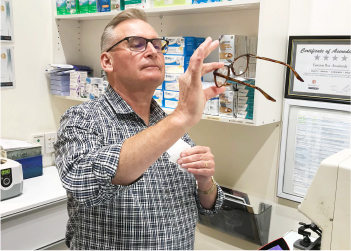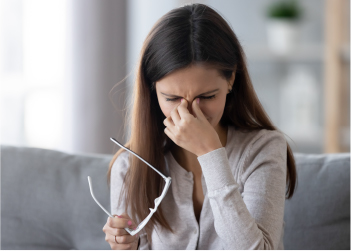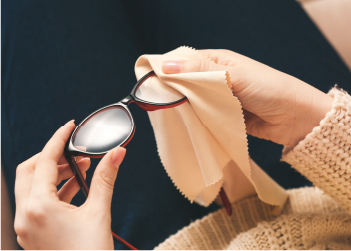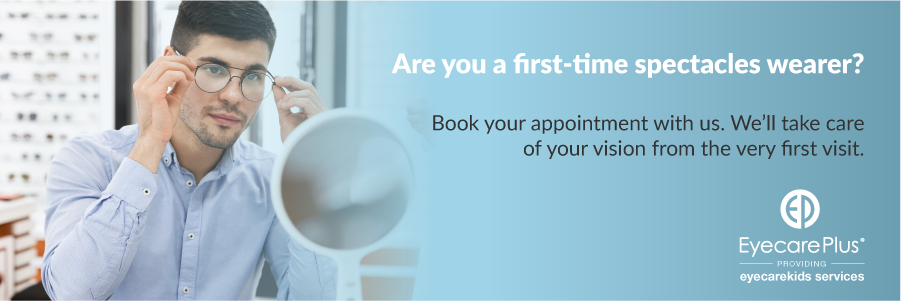So your optometrist informed you that you need spectacles to see clearly. This may evoke mixed feelings: Happy because spectacles make a good fashion accessory? Upset because this means something perched on your face all day when you are used to being so free? Worried about your sight?
What you will feel is not something new or unusual to most first-time spectacle wearers, but rest assured that optometrists prescribe spectacles to make things better for you—not worse.
Believe it or not, adjusting to a new pair of spectacles can be quite easy and very attainable. In no time, you’ll hardly even notice you’re wearing them!
Here are some tips if you’re a first-time spectacles wearer:
 1. Have your spectacles crafted and fitted by an eyecare professional. Your very first spectacles (or any spectacles, for that matter) should be crafted and fitted by an eyecare professional, preferably from the optometrist who tested your eyes. Several factors need to be considered to ensure that your lenses and frames fit so you’ll have not only clear but also comfortable vision. One important thing is measuring your pupillary distance (the distance between the centre points of your eyes) to make sure the powers of your prescription lie on the exact points where they’re needed. Your frames will most likely need adjustments to fit your unique ear curves, nose curve, cheeks, etc. Therefore, the best fit for your lenses and frames is attained when you are personally seen and fitted by an eyecare professional such as the optical dispenser at your optometrists. We highly discourage getting your spectacles from online, far away, where you can’t have in-practice care by a professional.
1. Have your spectacles crafted and fitted by an eyecare professional. Your very first spectacles (or any spectacles, for that matter) should be crafted and fitted by an eyecare professional, preferably from the optometrist who tested your eyes. Several factors need to be considered to ensure that your lenses and frames fit so you’ll have not only clear but also comfortable vision. One important thing is measuring your pupillary distance (the distance between the centre points of your eyes) to make sure the powers of your prescription lie on the exact points where they’re needed. Your frames will most likely need adjustments to fit your unique ear curves, nose curve, cheeks, etc. Therefore, the best fit for your lenses and frames is attained when you are personally seen and fitted by an eyecare professional such as the optical dispenser at your optometrists. We highly discourage getting your spectacles from online, far away, where you can’t have in-practice care by a professional.
 2. Feeling dizzy? This may help! If you find that your spectacles are making you feel dizzy, this is not unusual for the first few days, especially when your lenses are used to correct certain eye conditions such as astigmatism or if you are wearing multifocals or progressive lenses. What you can do: Take quick breaks from your spectacles as needed, work on building up until you are able to wear them comfortably. If, however, your dizziness persists for more than a few days, ask your prescribing optometrist to recheck the prescription.
2. Feeling dizzy? This may help! If you find that your spectacles are making you feel dizzy, this is not unusual for the first few days, especially when your lenses are used to correct certain eye conditions such as astigmatism or if you are wearing multifocals or progressive lenses. What you can do: Take quick breaks from your spectacles as needed, work on building up until you are able to wear them comfortably. If, however, your dizziness persists for more than a few days, ask your prescribing optometrist to recheck the prescription.
Other causes you may feel dizzy aside from the prescription being too strong is there could be a manufacturer error, or your lens or frame needs adjustment. This is why getting your spectacles from an eyecare professional with in-practice care is very important.
 3. Keep your spectacles clean. Smudges from our fingers or specks of lint or dust on our lenses are not only annoying, they can also impact your vision by creating spots on your vision or a halo effect when looking at lights. Sometimes they just make vision overall look blurry. Our spectacles can also collect oils and dirt from the environment or from our faces. To clean your spectacles, spray with lens spray and wipe with a soft microfibre cloth. You may also use lotion-free dishwashing liquid and run your spectacles under a gentle stream of tap water. Carefully dry them with a clean, soft, lint-free cloth. If you notice dirt collecting on hard-to-reach areas like between the lens and frame or nosepads, you may enquire from your optometrist if they offer an ultrasonic clean service that will remove all dirt including those hiding behind small cracks and crevices. (At Eyecare Plus, as part of our continuing service, we clean your spectacles free of charge with our ultrasonic clean machine!)
3. Keep your spectacles clean. Smudges from our fingers or specks of lint or dust on our lenses are not only annoying, they can also impact your vision by creating spots on your vision or a halo effect when looking at lights. Sometimes they just make vision overall look blurry. Our spectacles can also collect oils and dirt from the environment or from our faces. To clean your spectacles, spray with lens spray and wipe with a soft microfibre cloth. You may also use lotion-free dishwashing liquid and run your spectacles under a gentle stream of tap water. Carefully dry them with a clean, soft, lint-free cloth. If you notice dirt collecting on hard-to-reach areas like between the lens and frame or nosepads, you may enquire from your optometrist if they offer an ultrasonic clean service that will remove all dirt including those hiding behind small cracks and crevices. (At Eyecare Plus, as part of our continuing service, we clean your spectacles free of charge with our ultrasonic clean machine!)
 4. When not using your spectacles…
4. When not using your spectacles…
Spectacle lenses can easily get scratched if you leave your spectacles lying around everywhere.
When not using your spectacles for a short while, you may lay them on a table (somewhere safe, where they won’t get knocked down) upside down, with the temples open. Never place them on a table or counter with the lenses facing down.
When not using your spectacles for a few hours or longer, store them in a clean storage case. This includes when you take them off at bedtime. A case is also easier to spot when looking for your spectacles. Always keep your spectacles in one place so that when you need them, they are easy to find.

5. Tip for pet owners
If you own a pet which roams around the house, we suggest always keeping your spectacles in a case even if you remove them for just a short while. Cats may knock them off the table or toy with them. Pet dogs may lick or chew on spectacles. (They love spectacles because they gather oils from your face, so they smell like you!)
6. Maintaining your new spectacles so that they last longer

You’ve invested in your vision with a new pair of spectacles. Naturally, you would love for them to last long—at least until a new prescription is needed.
Spectacles don’t take much maintenance apart from careful handling, safe storage and daily cleaning. Always remove and put on your spectacles using both hands. Flinging them with just one hand can stress the joints in your frames and cause them to fit poorly and wear out quicker. When carrying your spectacles in a bag or a purse, always store them in a hard case to keep the lenses from being scratched or the frames from getting bent. Follow the cleaning routine as mentioned above or as instructed by your optometrist or optical dispenser.

